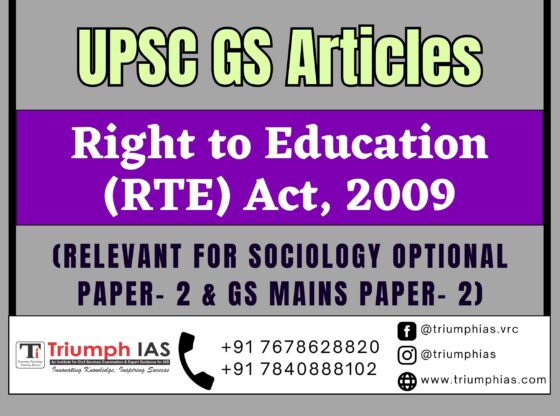Right to Education (RTE) Act, 2009
Relevant for sociology optional Paper- 2 & GS Mains Paper- 2

The Right to Education (RTE) Act, 2009 is a landmark piece of legislation in India that aims to provide free and compulsory education to all children between the ages of 6 and 14. The Act was passed by the Indian Parliament in August 2009 and came into effect on April 1, 2010. This Act is a significant step towards achieving the goal of universal education and ensuring that no child is left behind.
The RTE Act, 2009 is based on the premise that education is a fundamental right and that the State has a duty to provide free and compulsory education to all children. The Act provides for the establishment of a National Advisory Council (NAC) to oversee the implementation of the Act and to advise the Central and State Governments on matters related to education. The NAC is also responsible for monitoring the progress of the Act and making recommendations for its improvement.
One of the key provisions of the RTE Act, 2009 is the requirement for all private schools to reserve 25% of their seats for children from economically weaker sections and disadvantaged groups. The government reimburses these schools for the cost of educating these children, which includes not just tuition fees but also expenses related to uniforms, books, and other supplies. This provision is an important step towards ensuring that children from all backgrounds have equal access to education.
Another important provision of the RTE Act, 2009 is the requirement for all schools to have certain basic facilities, including a building with a minimum of one classroom per teacher, separate toilets for boys and girls, clean drinking water, and playgrounds. The Act also mandates that all schools have trained and qualified teachers, with a minimum teacher-student ratio of 1:30.
The RTE Act, 2009 also seeks to address issues of quality in education by laying down minimum standards for infrastructure, teacher qualifications, and curriculum. The Act mandates that all schools follow a common curriculum based on the National Curriculum Framework, and that teachers receive regular training to improve their skills and knowledge.
The RTE Act, 2009 has been widely praised for its potential to transform the education system in India. However, its implementation has faced several challenges. One of the biggest challenges has been the lack of funding for the Act, which has made it difficult for the government to provide the necessary infrastructure and resources to schools. Another challenge has been the lack of awareness about the Act among parents and the general public, which has made it difficult to ensure that all children are enrolled in school.
Despite these challenges, there have been some positive outcomes from the implementation of the RTE Act, 2009. According to the Annual Status of Education Report (ASER) 2018, there has been a significant increase in enrolment rates among children aged 6 to 14 since the Act was introduced. The report also notes that the proportion of children who can read and write at grade level has increased over the years, although there is still a long way to go in terms of achieving universal quality education.
In conclusion, the Right to Education (RTE) Act, 2009 is a significant step towards ensuring that every child in India has access to education, regardless of their socio-economic background. The Act lays down important provisions for infrastructure, teacher qualifications, and curriculum, and seeks to address issues of quality in education. While the implementation of the Act has faced several challenges, it has also led to some positive outcomes, including increased enrolment rates and improvements in learning outcomes. It is important for the government to continue to invest in education and to address the challenges facing the implementation of the RTE Act, 2009, in order to achieve the goal of universal quality education for all.
For more such free UPSC notes, Articles, News & Views Join our Telegram Channel. https://t.me/triumphias
Click the link below to see the details about the UPSC – Civils courses offered by Triumph IAS. https://triumphias.com/pages-all-courses.php


